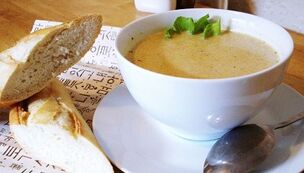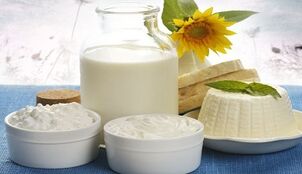
Pancreatitis is a serious disease of the pancreas, characterized by impaired production of digestive enzymes. The main symptoms of the disease are pain in the left or right hypochondrium after eating, heartburn, dizziness, vomiting, stomach discomfort.
Strict adherence to dietary rules is important in the treatment of pancreatitis. This is because the development of the disease is often caused by an unhealthy lifestyle, excessive consumption of alcohol and "junk" food.
An anti-pancreatitis diet can help patients reduce pain and increase remission during an exacerbation. Nutrition in acute and chronic pancreatitis is different, but still has some similarities. Let's talk about them.
General dietary rules for pancreatitis
The main requirement of the diet is to increase the amount of protein consumed and reduce the amount of fat and carbohydrates in the main diet (if possible, eliminate them altogether). In particular, the use of granulated sugar should be avoided, as it contains 99% of carbohydrates.
High-fiber, high-fat foods should be eliminated from the lives of people with pancreatitis. However, they are heavily loaded on the pancreas, and as a result, the body begins to produce excessive amounts of digestive enzymes, which can lead to dangerous and serious complications in the disease.
Doctors recommend that all people with pancreatitis take vitamin complexes to help compensate for the lack of vitamins and minerals in the body, which is due to limited nutrition.

Meals should be planned at the same time.
To avoid excessive stress and overeating in the stomach, eat 5-6 portions a day.
Diet for Acute Pancreatitis
As a rule, acute pancreatitis is characterized by sudden severe pain in the pit of the stomach. Diseases are unbearable, forcing people to call an ambulance. The diet for acute pancreatitis is "zero" until the doctor arrives. Under no circumstances should you eat. Neither "light" nor "heavy. "
It is allowed to drink non-carbonated mineral water before the doctor's visit, but not more than 3 glasses. And they are allowed to drink, if the process of urination is normal.
Acute pancreatitis is treated only in a hospital. For the first two days, the patient fasts. Only now is it allowed to drink rosehip broth with mineral water. The total amount of fluid you drink should not exceed 5 glasses per day.
On the third day of treatment, the patient is allowed to eat fresh, low-calorie foods that do not contain substances that irritate the pancreas and increase secretion.
After the main symptoms subside, the anti-pancreatitis diet is continued for a month or two. At this point, you should give up completely:
- fried and fatty foods;
- buns and pastries;
- pickles and smoked foods;
- salts and canned foods;
- bitter and sweet;
- onions and garlic;
- alcoholic beverages;
- fatty meat and fish;
- sausages.
All foods must be cooked. They should be boiled in water or steamed. Do not use oil, salt or spices in cooking.

The patient is allowed to eat only warm and chopped food. Before going to bed, it is recommended to use fermented milk products for diarrhea - kefir, fermented boiled milk.
The duration of the diet is 6 to 12 months. A person's future health depends on how he or she behaves. If all dietary recommendations are not taken into account, the disease can become chronic, and then the patient will have to be treated for life.
Diet for chronic pancreatitis in remission
The chronic pancreatitis diet is slightly different from the above diet. In this case, the patient's diet is significantly expanded, but only in remission. The diet will be completely different when intensified, but a little later about it.
In chronic pancreatitis, it is allowed to drink protein, which should exceed the daily requirement of a person, as well as the use of carbohydrates (sugar, honey, baked goods, baked goods, etc. ).
Limit foods that irritate the pancreas (hot spices, large amounts of salt, alcohol, etc. ).
The patient's diet should also be fractional. Number of meals from 4 to 6. The food served should be warm. There is no need to grind food before eating.
Meat and fish products should not be high in fat, otherwise it can lead to liver degradation during chronic pancreatitis. Cottage cheese contains many nutrients, so it should simply be in the patient's diet. However, you can only eat homemade cheese, but it is not very fatty. It is forbidden to eat cottage cheese.
If a person is unable to refuse bread, he is advised to use yesterday's pastries or crackers (only gray or black bread) during the meal. You can also eat baked goods and pastries, but in limited quantities (no more than one serving per day).
In pancreatitis, milk is not digested properly, so it is not recommended to drink it in its pure form. It can be added to tea or made from cereals and soups. Even if the patient is well tolerated, he should not drink too much milk. The maximum dose is 200 ml.

Fermented milk products are very useful for people with chronic pancreatitis. Even in other stages of the disease, cheese, which is included in the list of prohibited foods, can be consumed in remission, but not much, and you can feel better. Cheese should not be too salty or greasy.
Eggs should not be eaten whole. The patient's diet may include only egg whites. It can be used to steam omelets or add them to soups.
The patient's diet should not be high in fat (no more than 70 g per day). In addition, most of them should consist of vegetable oils. They are well absorbed and do not burden the pancreas.
Diet for chronic pancreatitis during exacerbation
The diet of pancreatic pancreatitis during exacerbation is the same as the acute form of the disease. The patient is allowed to eat small amounts of fresh and non-fat foods when fasting and positive dynamics begin.
If the patient's health does not deteriorate, the patient's menu will be gradually expanded. After 2-3 months a person can eat any food in remission phase.
Remember, this is just a severe pancreatitis diet. Check with your doctor for a complete list of permitted and prohibited products. Only he can create a proper diet, taking into account your health.














































































